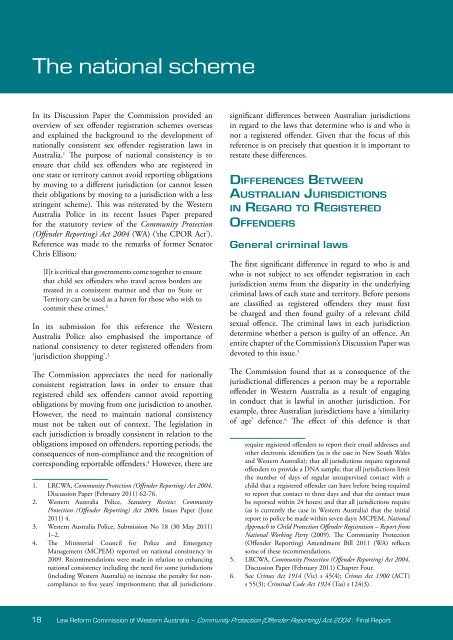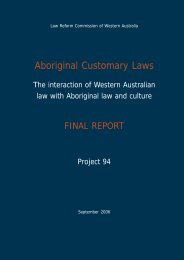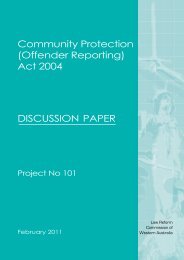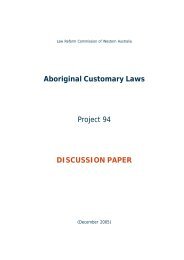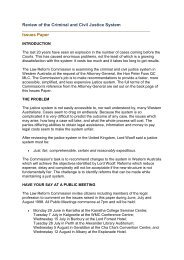The national schemeIn its Discussion Paper the Commission provided anoverview of sex offender registration schemes overseasand explained the background to the development ofnationally consistent sex offender registration laws inAustralia. 1 The purpose of national consistency is toensure that child sex offenders who are registered inone state or territory cannot avoid reporting obligationsby moving to a different jurisdiction (or cannot lessentheir obligations by moving to a jurisdiction with a lessstringent scheme). This was reiterated by the WesternAustralia Police in its recent Issues Paper preparedfor the statutory review of the <strong>Community</strong> <strong>Protection</strong>(<strong>Offender</strong> <strong>Reporting</strong>) <strong>Act</strong> <strong>2004</strong> (WA) (‘the CPOR <strong>Act</strong>’).Reference was made to the remarks of former SenatorChris Ellison:[I]t is critical that governments come together to ensurethat child sex offenders who travel across borders aretreated in a consistent manner and that no State orTerritory can be used as a haven for those who wish tocommit these crimes. 2In its submission for this reference the WesternAustralia Police also emphasised the importance ofnational consistency to deter registered offenders from‘jurisdiction shopping’. 3The Commission appreciates the need for nationallyconsistent registration laws in order to ensure thatregistered child sex offenders cannot avoid reportingobligations by moving from one jurisdiction to another.However, the need to maintain national consistencymust not be taken out of context. The legislation ineach jurisdiction is broadly consistent in relation to theobligations imposed on offenders, reporting periods, theconsequences of non-compliance and the recognition ofcorresponding reportable offenders. 4 However, there are1. LRCWA, <strong>Community</strong> <strong>Protection</strong> (<strong>Offender</strong> <strong>Reporting</strong>) <strong>Act</strong> <strong>2004</strong>,Discussion Paper (February 2011) 62-76.2. Western Australia Police, Statutory Review: <strong>Community</strong><strong>Protection</strong> (<strong>Offender</strong> <strong>Reporting</strong>) <strong>Act</strong> <strong>2004</strong>, Issues Paper (June2011) 4.3. Western Australia Police, Submission No 18 (30 May 2011)1–2.4. The Ministerial Council for Police and EmergencyManagement (MCPEM) reported on national consistency in2009. Recommendations were made in relation to enhancingnational consistency including the need for some jurisdictions(including Western Australia) to increase the penalty for noncomplianceto five years’ imprisonment; that all jurisdictionssignificant differences between Australian jurisdictionsin regard to the laws that determine who is and who isnot a registered offender. Given that the focus of thisreference is on precisely that question it is important torestate these differences.Differences BetweenAu s t r a l i a n Jurisdictionsin Re g a r d to Registered<strong>Offender</strong>sGeneral criminal lawsThe first significant difference in regard to who is andwho is not subject to sex offender registration in eachjurisdiction stems from the disparity in the underlyingcriminal laws of each state and territory. Before personsare classified as registered offenders they must firstbe charged and then found guilty of a relevant childsexual offence. The criminal laws in each jurisdictiondetermine whether a person is guilty of an offence. Anentire chapter of the Commission’s Discussion Paper wasdevoted to this issue. 5The Commission found that as a consequence of thejurisdictional differences a person may be a reportableoffender in Western Australia as a result of engagingin conduct that is lawful in another jurisdiction. Forexample, three Australian jurisdictions have a ‘similarityof age’ defence. 6 The effect of this defence is thatrequire registered offenders to report their email addresses andother electronic identifiers (as is the case in New South Walesand Western Australia); that all jurisdictions require registeredoffenders to provide a DNA sample; that all jurisdictions limitthe number of days of regular unsupervised contact with achild that a registered offender can have before being requiredto report that contact to three days and that the contact mustbe reported within 24 hours; and that all jurisdictions require(as is currently the case in Western Australia) that the initialreport to police be made within seven days: MCPEM, NationalApproach to Child <strong>Protection</strong> <strong>Offender</strong> Registration – Report fromNational Working Party (2009). The <strong>Community</strong> <strong>Protection</strong>(<strong>Offender</strong> <strong>Reporting</strong>) Amendment Bill 2011 (WA) reflectssome of these recommendations.5. LRCWA, <strong>Community</strong> <strong>Protection</strong> (<strong>Offender</strong> <strong>Reporting</strong>) <strong>Act</strong> <strong>2004</strong>,Discussion Paper (February 2011) Chapter Four.6. See Crimes <strong>Act</strong> 1914 (Vic) s 45(4); Crimes <strong>Act</strong> 1900 (ACT)s 55(3); Criminal Code <strong>Act</strong> 1924 (Tas) s 124(3).18 <strong>Law</strong> <strong>Reform</strong> Commission of Western Australia – <strong>Community</strong> <strong>Protection</strong> (<strong>Offender</strong> <strong>Reporting</strong>) <strong>Act</strong> <strong>2004</strong> : Final Report
consensual sexual activity with an underage person isnot unlawful so long as the age difference between thecomplainant and the accused is within the stipulatedage gap (two years in Victoria and the AustralianCapital Territory and between three and five years inTasmania, depending on the age of the complainant).The Commission referred to three Western Australianexamples where a juvenile was automatically deemeda reportable offender in circumstances where, if theconduct had occurred in Tasmania, the offender maynot have even been convicted of an offence. 7In addition, some jurisdictions retain an unlimiteddefence of an honest and reasonable but mistakenbelief that the complainant was of or above the age ofconsent. In 2002 this defence was significantly restrictedin Western Australia and it is now only available if theaccused is no more than three years older 8 than thecomplainant. In practical terms this means it is notavailable to any accused who is 19 years or over. InVictoria, 9 Queensland, 10 the Northern Territory, 11 theAustralian Capital Territory, 12 Tasmania, 13 and NewSouth Wales 14 the defence is available to an accused ofany age. The Commission observed in its DiscussionPaper that the Western Australian law in this area is morerestrictive than all other Australian states and territoriesother than South Australia. 15The Commission’s research revealed a number of caseswhere reportable offenders in Western Australia aresubject to the CPOR <strong>Act</strong> (for 15 years) as a result ofengaging in sexual activity with an underage person incircumstances where they believed that the complainantwas of or over the age of 16 years. 16 If the conduct had7. LRCWA, <strong>Community</strong> <strong>Protection</strong> (<strong>Offender</strong> <strong>Reporting</strong>) <strong>Act</strong> <strong>2004</strong>,Discussion Paper (February 2011) Case Examples 1, 2 & 3.8. Criminal Code (WA) s 321(9).9. Crimes <strong>Act</strong> 1914 (Vic) s 45(4).10. Criminal Code (Qld) s 215(5).11. Criminal Code (NT) s 127(4). However, the defence is onlyavailable in the Northern Territory if the complainant isactually 14 years or older.12. Crimes <strong>Act</strong> 1900 (ACT) s 55(3).13. Criminal Code <strong>Act</strong> 1924 (Tas) s 124(2).14. See Johnston v R [2009] NSWCCA 82 [8].15. LRCWA, <strong>Community</strong> <strong>Protection</strong> (<strong>Offender</strong> <strong>Reporting</strong>) <strong>Act</strong> <strong>2004</strong>,Discussion Paper (February 2011) 91. In South Australia themistaken age defence is only available if the complainant isactually aged between 16 and 17 years and the accused believedthat the complainant was 17 years or over (the age of consentin South Australia is 17 years): Criminal <strong>Law</strong> Consolidation <strong>Act</strong>1935 (SA) s 49.16. LRCWA, <strong>Community</strong> <strong>Protection</strong> (<strong>Offender</strong> <strong>Reporting</strong>) <strong>Act</strong> <strong>2004</strong>,Discussion Paper (February 2011) Case examples 5, 6 & 8. Inone of these cases the complainant lied about his age (to theoffender and others) and told the offender that he was studyingat a tertiary institution. In another case the complainant toldthe offender that she was over the age of consent and he believedher because she was living independently from her parents.occurred in most other parts of Australia the accusedwould have had a defence available to the charge.The above discussion demonstrates that there is a clearlink between the general criminal law and whether aperson is classified as a registered sex offender. Becauseof the differences in the general criminal law of eachAustralian jurisdiction the behaviour underpinningregistration in each jurisdiction varies.Range of ‘registrable offences’In each jurisdiction the applicable sex offender registrationlaws include a list or description of registrable offences (ie,offences for which a person is registered). The MinisterialCouncil for Police and Emergency Management workingparty observed in 2009 that a ‘key point of differencebetween registers in each jurisdiction is the range ofregistrable offences’. 17 For example, child murder is aregistrable offence in all jurisdictions other than Victoria.Even so, jurisdictions vary in regard to the types of childmurders that are captured. In Western Australia, NewSouth Wales, Queensland and the Northern Territoryany murder of a child is a registrable offence; 18 however,in the Australian Capital Territory, South Australia andTasmania the murder of a child is only registrable if it isconnected to the commission or attempted commissionof a sexual offence. Moreover, some jurisdictions includekidnapping and manslaughter (if the victim is a child)but these offences are not currently included in WesternAustralia.The Western Australia Police indicated in its IssuesPaper that it was planned to include the offences ofkidnapping and stealing of a child (but not a child whois a defacto or lineal relative of the offender) as reportableoffences under the CPOR <strong>Act</strong>. These changes have beenincorporated into the <strong>Community</strong> <strong>Protection</strong> (<strong>Offender</strong><strong>Reporting</strong>) Amendment Bill 2011 (WA). 19 The Bill alsoproposes to add the offence under s 204A of the Code(showing offensive material to a child under the age of16 years) to the list of reportable offences. It has beennoted by the Western Australia Police that no otherjurisdiction includes an offence similar to the offencecreated by s 204A. 2017. MCPEM, National Approach to Child <strong>Protection</strong> <strong>Offender</strong>Registration – Report from National Working Party (2009) 11.18. For example, a mother who smothered her newborn baby wouldbe included on the sex offender register in these jurisdictions.19. <strong>Community</strong> <strong>Protection</strong> (<strong>Offender</strong> <strong>Reporting</strong>) Amendment Bill2011 (WA) cl 38.20. Western Australia Police, Statutory Review: <strong>Community</strong><strong>Protection</strong> (<strong>Offender</strong> <strong>Reporting</strong>) <strong>Act</strong> <strong>2004</strong>, Issues Paper (June2011) 26. It was stated that the provisions of the New SouthWales legislation might cover an offence of showing offensivematerial to a child.Chapter One : Overview of the <strong>Community</strong> <strong>Protection</strong> (<strong>Offender</strong> <strong>Reporting</strong>) <strong>Act</strong> 19


